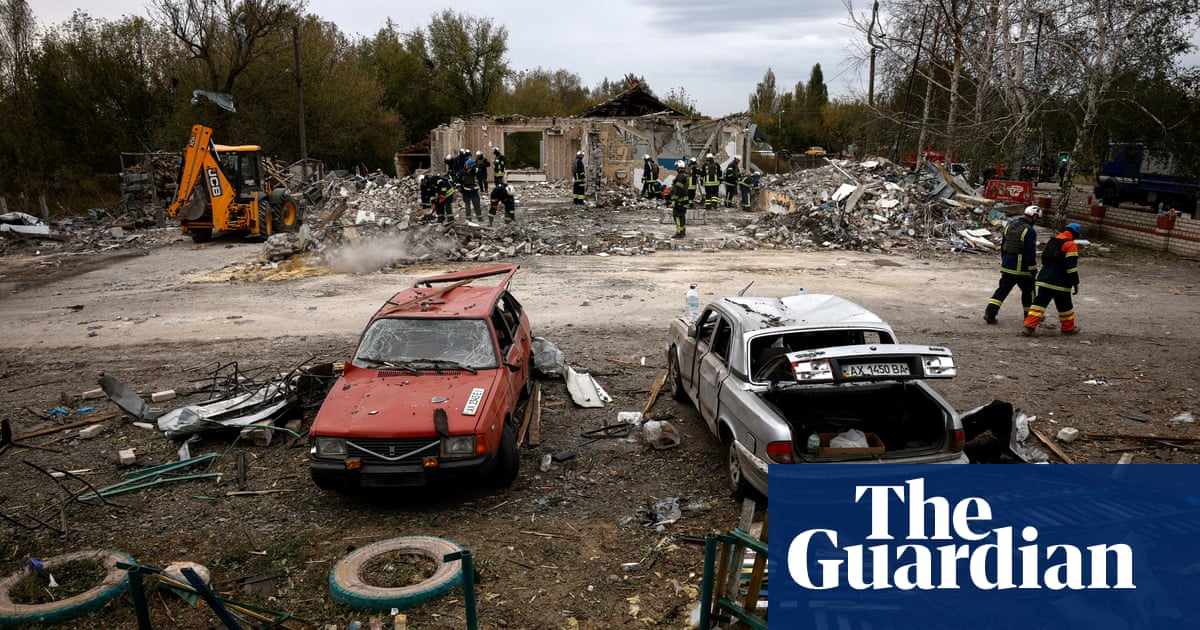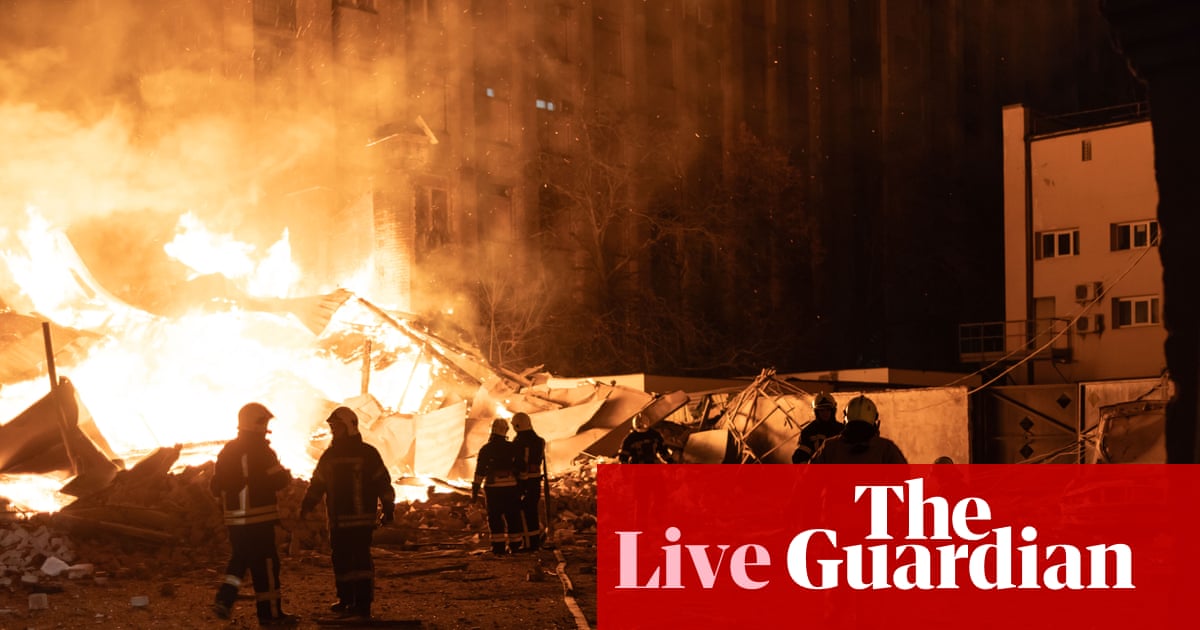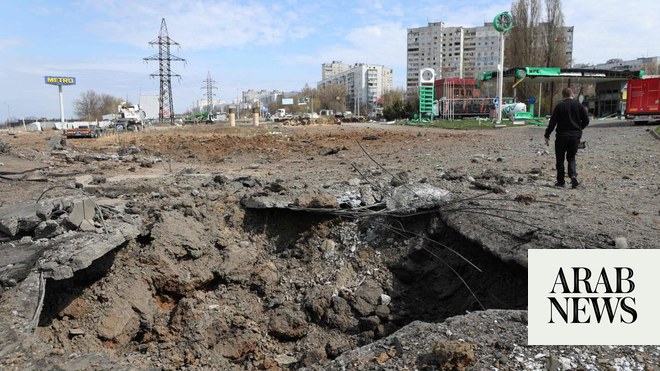
When the air raid siren sounded, Yurii Ivanovitch rang his wife, Halyna. She was at home, working on the balcony of their fourth-floor apartment in central Kharkiv. “Get inside,” he warned her. Seconds later he heard an explosion: a terrifying and demonic bang. “Everything is falling. It hit me,” Halyna said. “I’m hurt. Blood is flowing.”
A Russian missile had landed in their yard. It obliterated a cinema, blew out windows, and raked Yurii’s garage with shrapnel. Debris struck Halyna on the back of the head. A door, blown from its frame, bowled her over. She staggered to her feet and crawled to the bedroom. Paramedics pulled her out, stepping over a sea of broken glass. They took her to hospital.
This week Yurii showed the apartment where he and Halyna – both 83 – had lived for two happy decades. It was a macabre mess. His wife’s blood was everywhere. A trail of vermilion handprints began outside the bathroom and continued into the hallway, snaking past piles of dust-covered books. Halyna’s pillow was stained a vivid pink.
“This is the work of that war criminal Putin. Shame on him,” Yurii said defiantly. He added: “Kharkiv is 30% in ruins. Hundreds of civilians have died because of Putin. He has brainwashed Russians to hate us. They support him. We never thought it was possible he could start a war against Ukraine. He should stand trial for his many crimes in The Hague.”
Since the beginning of Russia’s all-out invasion, Kharkiv – Ukraine’s second city – has been under constant attack. But the strike on 30 December 2023, which hit the couple’s home on Girshmana street, marked the beginning of something new. Yurii found a sinister fragment of the rocket in his living room. It appears to have come from far away: North Korea.
Russia denies this. But the US says Moscow has twice fired North Korean-supplied short-range ballistic missiles into Kharkiv, with a second large-scale attack on 2 January. Western governments have condemned the illegal transfer, which includes 1m artillery shells last autumn supplied by Pyongyang. Exports violate UN security council resolutions, and heap more suffering on Ukrainians, the state department has said.
Dmytro Chubenko, an official at Kharkiv’s prosecutor’s office, said the remains of the suspected North Korean missiles had been sent to Kyiv for analysis. He explained that there appeared to be subtle differences with the Russian-produced Iskander missile. The suspected North Korean version came with hand-drawn – as opposed to machine-engraved – lettering for serial numbers, and used a different nozzle exhaust cone and welding.
“This development is bad for us. It means Russia has more rockets for strikes,” said Chubenko, speaking in a snowy compound where investigators have collected 1,000 enemy projectiles, piled into a ghoulish graveyard. “At first we thought the rockets fired over New Year were Iskanders. Then we realised it wasn’t a typical missile. We concluded they came from the DPRK [Democratic People’s Republic of Korea].”
In February 2022 Moscow tried to seize Kharkiv as part of its blitzkrieg invasion. The plan failed. That autumn Ukrainian troops liberated most of occupied Kharkiv oblast. Fighting continues around the town of Kupiansk and in nearby forests. The Kremlin intends by spring to seize all of the Donetsk and Luhansk oblasts, Ukrainian defence sources think, and to enter Kharkiv within 36 months.
For now, Russia is bombing the city, which has a population of 1.2 million people, on a daily basis. The distance from Russia’s Belgorod province to downtown Kharkiv, with its shops, modern restaurants and communist-era buildings, is a mere 25 miles (40km). It is too risky to station a Patriot missile battery system close to Russia’s border and Ukraine’s air defences struggle to shoot down S-300 and Iskander missiles. “They can reach us in under a minute. There’s not always time to sound the alarm,” said Chubenko.
The attacks on 30 December also featured drones and a devastating missile strike on the five-star Kharkiv Palace hotel, used by journalists. A Ukrainian translator and a British security guard working for Germany’s ZDF TV channel were injured. On Wednesday a giant crane pulled debris from an upper storey. The hotel overlooks Kharkiv’s cobbled freedom square. It is beyond repair.
The targeting of international reporters appears deliberate. On 10 January, Russia bombed the nearby Park hotel at 10.30pm, soon after a French media team checked in. One S-300 careened into the roof of a guest building, setting it alight; another fell next to the entrance. Two female hotel staff – Sasha Babak, 26, and Lika Zavarza, 23 – were sitting in the bar area when the missiles struck.
“We were discussing my drawing class. Suddenly the windows and walls flew at us,” Lika recalled. The blast tore through the reception area, where her colleague Anatoliy was on duty. “He was in a bad condition, buried under rubble and crying: ‘Help.’ We had to drag him out. I found blood on the back of my head. The door to the street was blocked so we climbed out through a window.”
Sasha said she realised the hotel might be a target, and immediately understood what had happened. “The boom and explosion were simultaneous. I felt a sharp pain in my nose,” she recalled. She had been living in the hotel after a previous strike trashed her apartment. “Kharkiv is my city. We don’t deserve this. The Russians hate us and want to break us.”
Russia said it had targeted foreign mercenaries and a “Nato general”. The women said the claim was ludicrous. The 23 guests in the hotel complex were all civilians. They included three Ukrainian families and two journalists working for a Turkish news agency, plus eight employees. Thirteen people were wounded. Sasha took a video of herself inside the building. “We are alive! All alive,” she croaked.
Oleh Syniehubov, the governor of the Kharkiv region, described Russia’s unrelenting attacks as “chaotic”. He said the number had gone up since late November 2023, as Ukraine’s own supplies of shells and weapons began to dwindle. The strikes were mostly against civilian infrastructure. Villages near the frontline were hit, too, with 10 to 15 attacks every day, he said.
He conceded the war was unlikely to finish “any time soon”. A lot of people who fled at the start of the invasion returned in 2022 and last year. They were now living in exhausting conditions, sleeping in corridors, and hoping each night for the best amid constantly wailing sirens. “People are not OK. They are tired. They are losing loved ones. That’s the problem,” the governor said.
The only way to defeat Russia was with western help, he added. He acknowledged the international situation was concerning, as Republicans in Congress blocked $61bn (£48bn) in essential military aid for Ukraine, and as crises in the Middle East dominated the news. “We have to unite the world in the struggle against international terrorism,” he said, stressing: “We badly need more air defence.”
On Wednesday emergency workers were clearing up after yet another strike, this one the previous evening on Blahovishchenska Street. In daylight they pulled down the facade of a building, which was left sagging perilously. Clouds of dust engulfed the pavement. Seventeen people were hurt. Two were in a serious condition. The impact could be felt across the city. Doors shook, as if battered by an angry god.
One of the victims, Oksana Puzan, 43, was recovering on Friday in Kharkiv’s regional clinical hospital. Doctors removed a small piece of shrapnel from her brain. “I was asleep. The explosion woke me up. I thought it was the end,” she said. She added: “We don’t understand why they attack us.” What was her plan now? “I will continue to live,” she replied.
Back in Girshmana Street, Yurii denounced Russia and North Korea’s partnership. “They are a tangle of snakes. The world should condemn Kim Jong-un for what he has done,” he said. His wife was slowly recovering, but was unaware their flat was uninhabitable. He had tidied up his library of 3,000 books, featuring works by Ukraine’s bard Taras Shevchenko, the novelist Pavlo Zahrebelnyi and various encyclopedias. “Reading is my passion,” he said.










